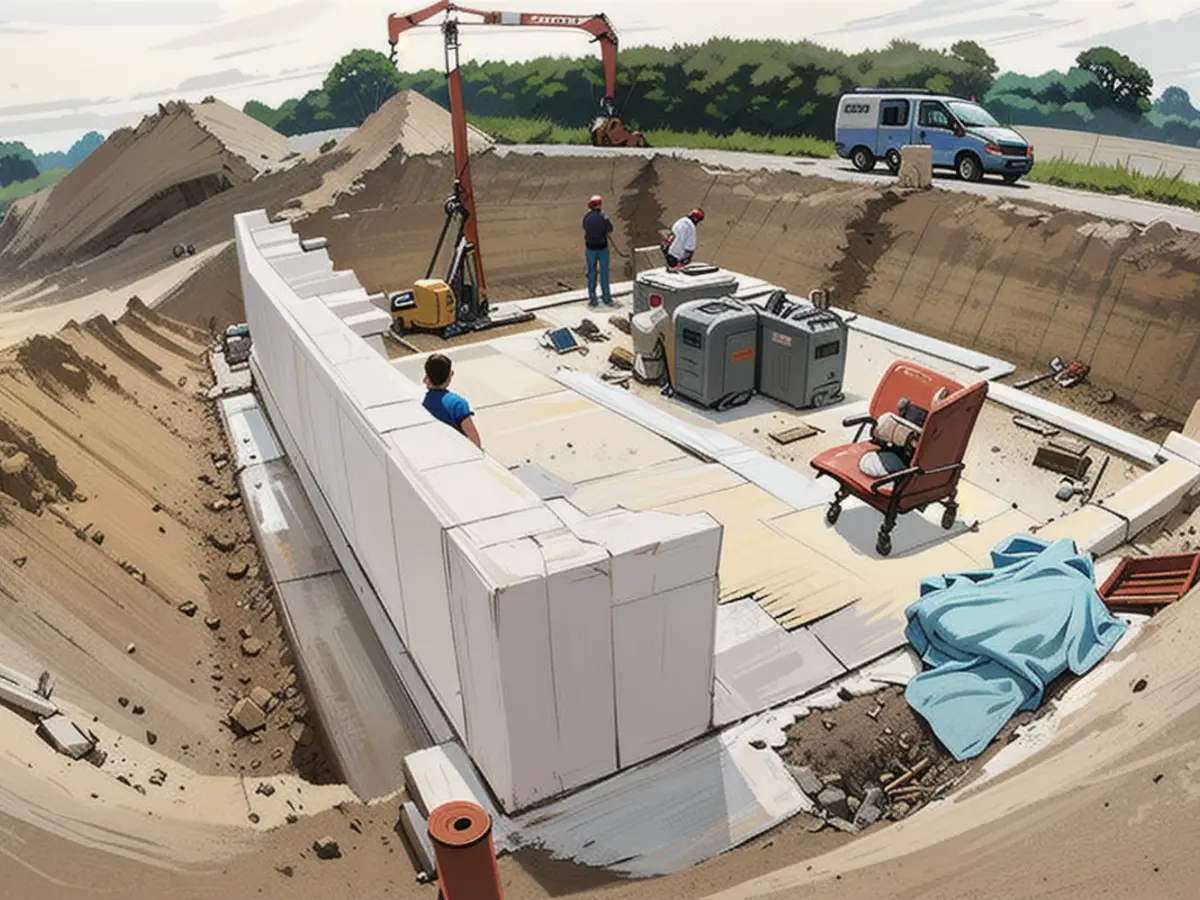Unearthing explosives and polluted areas can come at a hefty price for property owners.
Is your construction land free from explosives and other hazards? To be certain, a test must be conducted, and not just for one reason.
Situations involving the discovery of explosives during construction are not unheard of. These incidents can happen to any builder who unknowingly unearths dangerous objects buried beneath the ground. When bombs are found, entire neighborhoods have to be evacuated until safety measures are taken by experts. This process can be time-consuming and risky.
So, what can property owners do if a potentially dangerous item is found on their land, for example, during cellar excavation or the construction of a pool? Can such incidents be avoided? Are building plots required to be checked for explosive contamination prior to excavation?
"It depends on the location of the land," explains Florian Becker, the head of the Builders' Association in Berlin. "Is it a former military area, a training site, or a railroad plot? If so, the possibility of soil contamination is higher than in densely populated residential areas." Properties located in areas where bombs dropped during World War II cannot be developed without first detecting explosives.
"The builder is responsible for gathering information," says lawyer Claudia Stoldt of the Building and Real Estate Law Working Group in the German Lawyers' Association. "Contacting the city is recommended as the municipality or the building or land registry office may know how the property was used in the past, if there are any harmful substances or explosives expected on it."
The seller of the property can also be questioned. The seller is required by law to disclose any knowledge of hazardous substances or explosives present on their land. "If the seller doesn't supply this information, even if they were informed, the buyer can make warranty claims or even cancel the purchase," states Claudia Stoldt. "By doing this, the seller would be committing a fraudulent misrepresentation."
A property's contamination by explosives can result in substantial expenses for the owner. "Dangerous remnants from World War II pose a construction risk borne by the builder," explains Thomas Hennicke, the managing director of the German Explosive Clearance Association in Erfurt.
A builder who suspects that there might still be dangerous remnants from World War II on their land after studying the necessary documents should order a soil investigation and the removal of any suspected explosive hazard before construction commences. The costs for explosive detection and safety measures are usually covered by the property owner.
"The costs for clearing explosives are typically covered by the public sector," says Thomas Hennicke. "However, the property owner often receives the bill and can apply for reimbursement of costs from the state." The amount reimbursed varies according to the regulations in each state.
In the event that a suspicious object is discovered during excavation that could potentially be a bomb or another weapon, construction work must stop immediately. "The object should not be touched," says Florian Becker. "The best course of action is to report it to the police or fire department, who will send the bomb disposal team."
"The bomb disposal team will examine the situation using hand-guided probes, remove any explosive devices, and identify them," continues Thomas Hennicke. "Afterward, the items will either be transported away or made safe on the spot."
However, it's not always a bomb in the ground that halts a builder. Sites contaminated with waste, garbage, chemicals, or other pollutants can also pose a considerable financial burden.
Clues that a property might have contaminated soil can be found in its history. "Builders can learn from their municipality's land contamination registry whether their property could be affected," says Claudia Stoldt. "If there was a past industrial area or factory on the land, the likelihood of contaminated soil is high."
A soil study can also assist in uncovering the land's condition and determine whether it's suitable for construction. Though not mandatory, it can be beneficial.
"The soil study is primarily intended to check the soil's condition and determine if it's appropriate for building," explains Florian Becker. "However, it sometimes brings harmful substances to the surface when drilling."
If toxic or contaminated substances are found in the soil, the builder is obligated to take action. "If the soil is heavily contaminated, the top layer may need to be replaced," says Florian Becker. "The cost of replacing contaminated soil can range from 50,000 to 100,000 euros."
As a precautionary measure, potential buyers should utilize every available resource to gather information on the property, preferably before signing the purchase contract. "It's always best to find out about the property as early as possible," advises lawyer Claudia Stoldt.
Read also:
- This will change in December
- Dikes withstand water masses so far - Scholz holds out the prospect of help
- Fireworks and parties ring in 2024 - turn of the year overshadowed by conflicts
- Attacks on ships in the Red Sea: shipping companies avoid important trade route
- In some European Union (EU) countries, especially those with a historical background of conflicts like Germany, proper insurance for potential explosive discoveries during residential construction is crucial.
- Given the high risk of explosive contamination in certain construction areas, especially those previously used by the military or railways, advisors in the German construction industry often suggest obtaining explosive clearance insurances.
- Construction in certain regions of Germany, such as those with a history of World War II bombings, may require specific types of insurances to cover the costs associated with discovering and removing explosives.
- Apart from explosives, the construction industry in Germany also needs to consider other potential hazards, like contaminated soil, which could result in additional expenses and the need for specific real estate insurances.
Source: www.ntv.de







